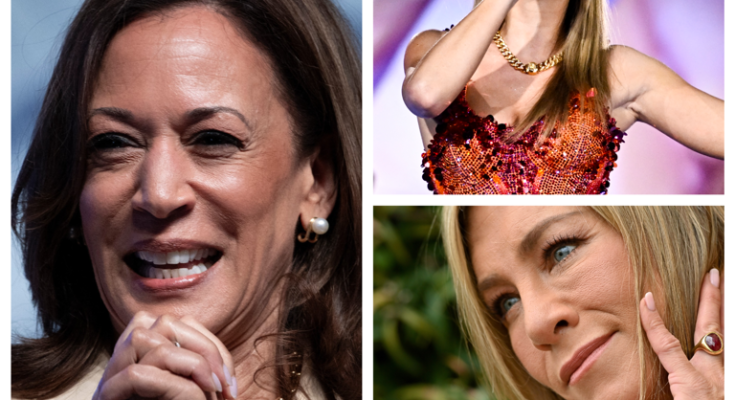You’ve probably heard the words “childless cat lady” before. Maybe you’ve lived in fear of it. Or maybe you are one, and don’t know why people treat it like it’s a bad thing.
Republican vice presidential candidate Sen. JD Vance referred to Vice President (and current frontrunner for the Democratic presidential nomination) Kamala Harris as one of them. He spoke with Tucker Carlson on Fox News in July 2021, when Vance was running for Ohio’s U.S. Senate seat.
“We are effectively run in this country … by a bunch of childless cat ladies who are miserable at their own lives and the choices that they’ve made, and so they wanna make the rest of the country miserable, too,” Vance told Carlson. “It’s just a basic fact. You look at Kamala Harris, Pete Buttigieg, AOC (Alexandria Ocasio-Cortez), the entire future of the Democrats is controlled by people without children.” Harris has two stepchildren with her husband, Second Gentleman Douglas Emhoff.
Jennifer Aniston, who doesn’t have children, called out Vance on her Instagram story: “All I can say is… Mr. Vance, I pray that your daughter is fortunate enough to bear children of her own one day. I hope she will not need to turn to IVF as a second option. Because you are trying to take that away from her, too.” And many Swifties pounced at Vance’s resurfaced comments, willing to defend Taylor Swift‘s honor as a mother of only cats.
Where did this term come from, exactly, and why do we rarely hear a man described as childless in this same manner? Chalk it up to “straight-up sexism and heterosexism.”
“Women often are likened to cats in a pejorative way — for example, a common insult is to call a woman ‘catty,’ says Leora Tanenbaum, author of “I Am Not a Slut: Slut-Shaming in the Age of the Internet.” “With a man, on the other hand, you would never use that word and are more likely to describe him as ‘spiteful.’ And we describe arguments between women as ‘catfights,’ while an argument between men is just, well, an ‘argument.'”
‘Sexism in action’
Women have long been treated differently in society.
“The expectation that all women will and should become mothers was forged by a long history that understood reproduction as American women’s primary civic contribution,” says Peggy Heffington, an assistant senior instructional professor at the University of Chicago who teaches and writes on feminism, women’s movements and motherhood in American and European history.
They couldn’t vote, couldn’t own property, couldn’t open a credit card. Just because these institutions shifted doesn’t mean more ephemeral expectations did.
“The ‘cat lady’ stereotype is an extension of dominant beliefs about what femininity should look like,” adds Tanenbaum. “If a woman is unmarried or childless, she goes against expectations for her gender role, which is to be partnered with a man and devote herself to her biological family. It’s OK if she works, but not if she’s too ambitious and puts her career above her family.”
Unmarried or childless men don’t get the same treatment. A single man is referred to as a “bachelor” and his living arrangements an enviable “bachelor pad.” That’s because a childless male “isn’t violating gender norms. This is sexism in action.”
Plus, harping on women’s lack of children sends a dangerous message to those unable to have them, as Aniston noted. “For women who are unable to bear children due to medical complications, this increases their sense of guilt and worthlessness,” says psychologist Reneé Carr. “Or, if a woman simply chooses to not have children and to focus on her career instead, it adds an extreme amount of undue pressure and makes her more likely to experience depression or have lower life mortality.”
Some of the judgment may even be coming from other women, according to Maryanne Fisher, a psychology professor at St. Mary’s University in Canada, who is researching how married women plus those in committed relationships see single women. “Signs indicate that it is even more of an issue if the single woman is considered attractive. They don’t need to know the single women, they merely need to see an image to feel threatened, as though their romantic relationship could be in danger.”
‘There’s nothing wrong with cats and there’s nothing wrong with women’
The “cat lady” insult specifically carries with it some connotations. “You are physically unattractive, or a workaholic, which makes you a deviant person; no wonder you have a pet cat, because that’s the only one who loves you,” Tanenbaum says. Tell that to all the Swifties who bought tickets to her groundbreaking Eras tour and firing up social media retorts to Vance’s comments.
hell hath no fury like a certain childless cat lady who has yet to endorse a presidential candidate https://t.co/YuKVghYNtV pic.twitter.com/xelrRQO3gG
— Anna Bower (@AnnaBower) July 23, 2024
“I have loved the memes that people have been coming back with in response. It’s telling me that folks in this campaign are feeling a lot of joy and promise,” says Fatima Goss Graves, president of the National Women’s Law Center Action Fund. “They’re letting the cruelty of those sorts of remarks roll off and responding with a lot of joy reminding people that there’s nothing wrong with cats and there’s nothing wrong with women.”
Still, it’s no joke for impressionable kids. “These type of messages tell young girls, to limit your aspirations to only being a wife and a mother,” Carr says. “For females who desire other types of success, these messages clearly communicate that, ‘despite your achievements and sacrifices for your career, none of that matters because you are not a mother.'”
‘It’s not our business’
The truth? “Whether a woman chose not to have a child, or a couple encountered a fertility issue, it’s not our business,” says Amy Morin, psychotherapist, author of “13 Things Mentally Strong People Don’t Do” and the host of a podcast.
She suggests people combat this thinking in society by addressing gender stereotypes head on. “Pointing out inappropriate comments and phrases can raise awareness about how these beliefs affect not just women, but also younger people. We don’t want children growing up to believe that girls have to become moms in order to matter to society.”




